Grocery shopping is getting a bit rough these days with prices that are higher than ever and shelves that always seem to be half empty. So now is a great time to revisit one of the most inexpensive and versatile pantry staple ingredients available: rice. Once you know how to cook rice on the stovetop, you’ve got an inexpensive and filling base upon which you can build a million different meals!
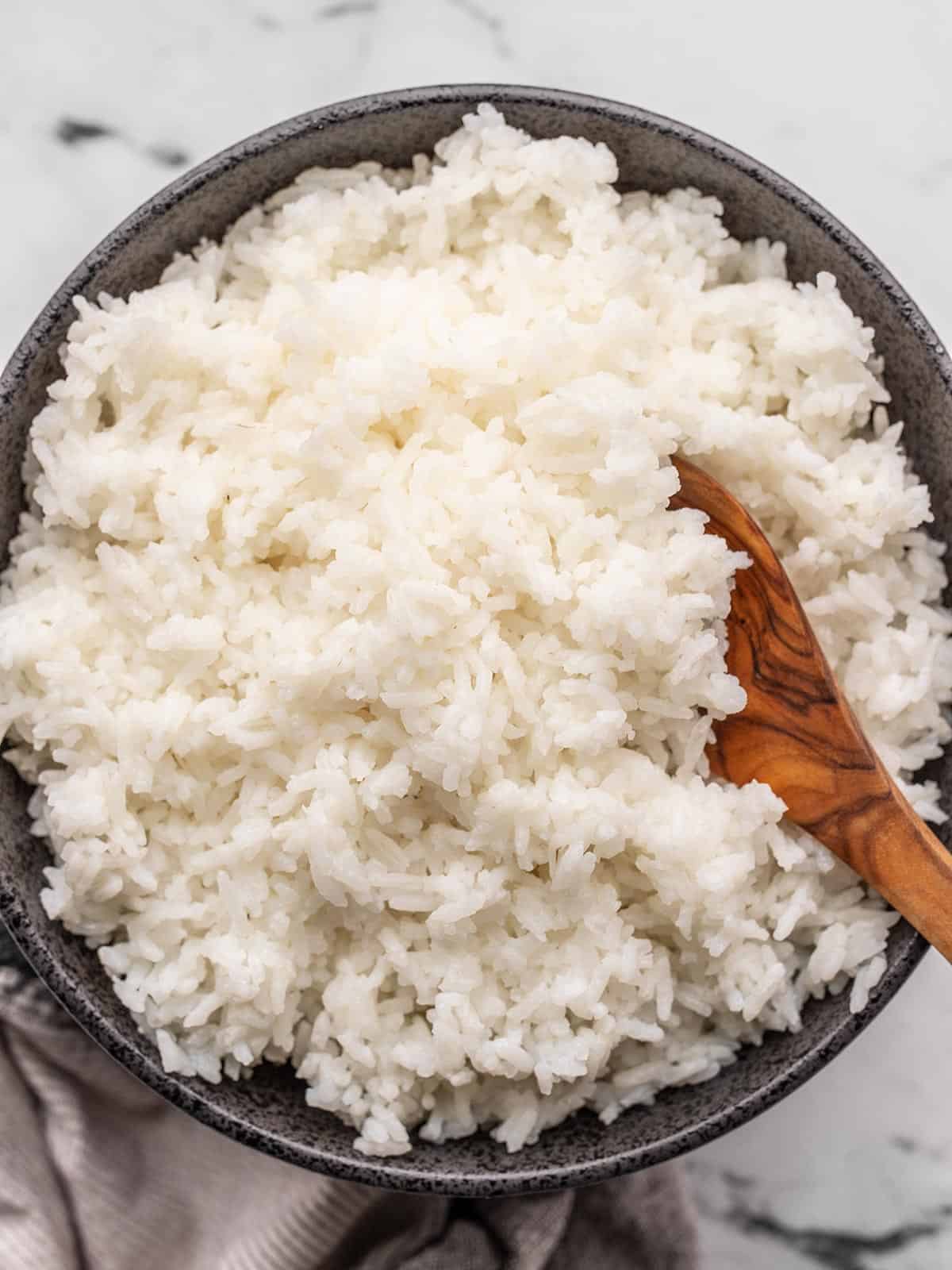
All recipes are rigorously tested in our Nashville Test Kitchen to ensure they are easy, affordable, and delicious.
Cooking Rice on the Stovetop
Cooking rice on the stovetop is just one of many ways you can cook rice. It’s my preferred method because it’s simple, it doesn’t require special equipment, and it’s fairly quick. That being said, you might find that you like a different method better.
You can also cook rice in a rice cooker or an Instant Pot, you can bake it in the oven, you can cook it in a microwave, and you can even cook it in an excess of water, kind of like pasta! Each of these methods has its pros and cons, so you can always experiment with another method if you’re not a fan of cooking rice on the stovetop.
What Type of Rice to Use
There are a lot of different types of rice in the world and each cooks a little differently. For that reason, this tutorial will only cover white and brown long grain rice. Other types of rice will require different amounts of liquid, different cook times, and maybe even a different method altogether.
Should I Rinse my Rice?
Rinsing rice before it’s cooked can be helpful for a couple of different reasons. Not only does it help remove debris and other contaminants, but it can also help remove excess starch, which tends to make rice a little more sticky once cooked.
The easiest way to rinse rice is to use a fine wire mesh sieve or strainer. This will allow the water to rinse right through without the risk of accidentally pouring out the rice along with the rinse water, and without inadvertently leaving a lot of excess water in the rice.
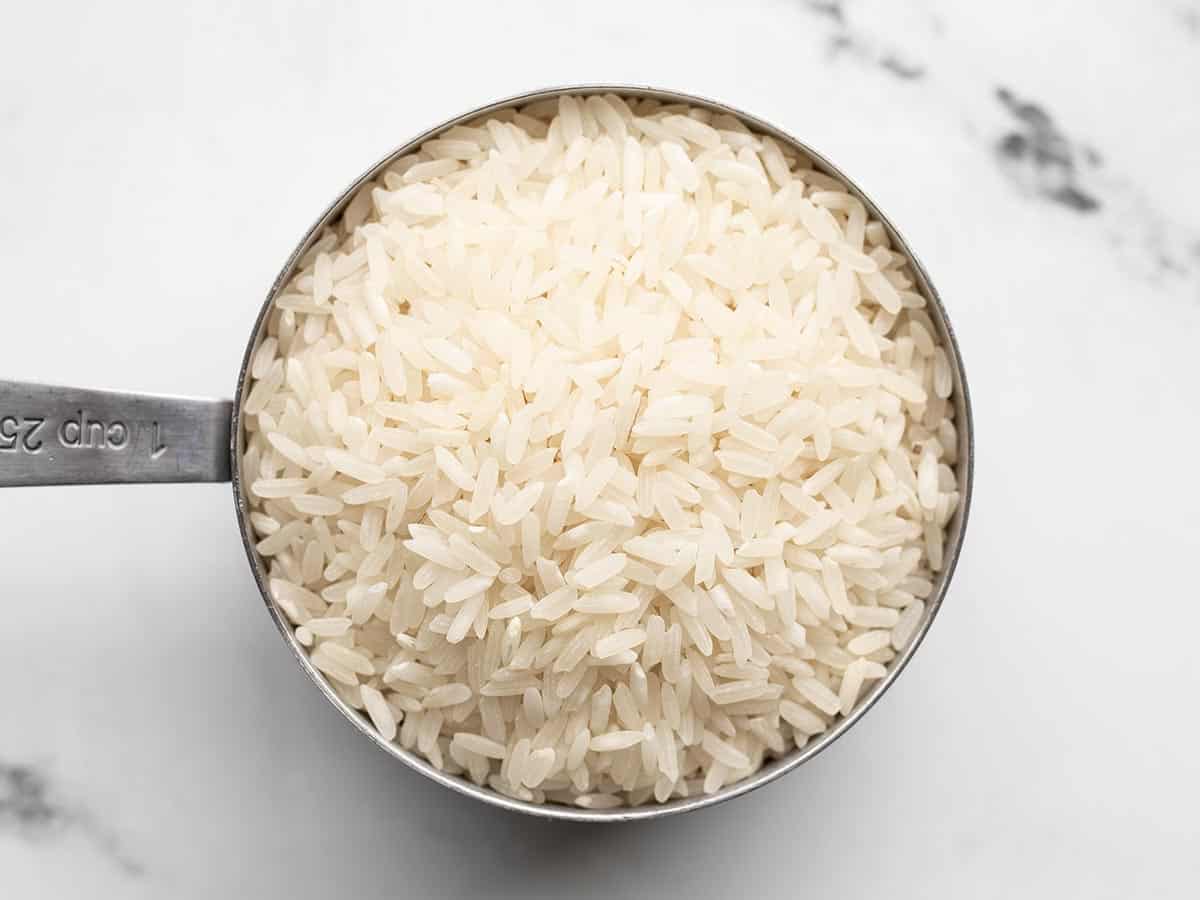
Water to Rice Ratio
Using the correct amount of water and rice will have a big impact on how your rice turns out. Use too much water and your rice will be mushy. Use too little water and your rice might not cook through. The exact amount to use can also vary based on your cookware and your personal preferences, but in general, for long grain white rice, you can use between 1.5 to 2 cups of water for every cup of uncooked rice (use less for more firm rice, more for softer rice). Brown rice needs a little more liquid, so you can use 2 to 2.25 cups of water for every cup of uncooked brown rice.
Another method for determining the amount of water needed is the knuckle method. This ancient measuring technique is considered fool-proof by those who use it. Simply place your rinsed rice in your pot or rice cooker, touch the top of the rice with your fingertip, then add water until the top of the water comes up to the first knuckle after your fingernail. Sounds crazy, but it works!
Use The Correct Cookware
Using the correct cookware will also help you achieve perfectly cooked rice with less effort. Here are some tips:
- Make sure to choose a pot that is the correct size for the amount of rice you’re cooking. Choose a pot that is about 6-8x the volume of uncooked rice (cook one cup of rice in a 1.5-2 quart pot).
- Use a thick-bottomed or heavy-duty pot because they will heat more evenly and reduce the chances of burning the rice.
- Make sure you’re using a burner that is close in size to the bottom of your pot. This will help the rice cook evenly and prevent crunchy, undercooked rice around the outside edges of the pot.
How to Add More Flavor to Rice
One of the reasons I love rice, aside from being so filling and affordable, is that it is so easy to change the flavor. Here are a few easy ways to add more flavor to your rice:
- Toast the rice in butter or oil before adding water. This gives the rice a deeper, toastier flavor.
- Add aromatics, like minced garlic or diced onion to the rice and water before cooking.
- Add herbs and spices to the water before cooking.
- Use a flavored liquid in place of water. You can cook rice in broth, stock, milk, or coconut milk for even more flavor.
- Finish with flavor: Add a drizzle or sprinkle of your favorite sauce, spice, or herb after cooking, then fold gently to combine (think citrus juice, fresh herbs, finishing oils, etc.).
Here Are Some of my Favorite Rice Recipes:
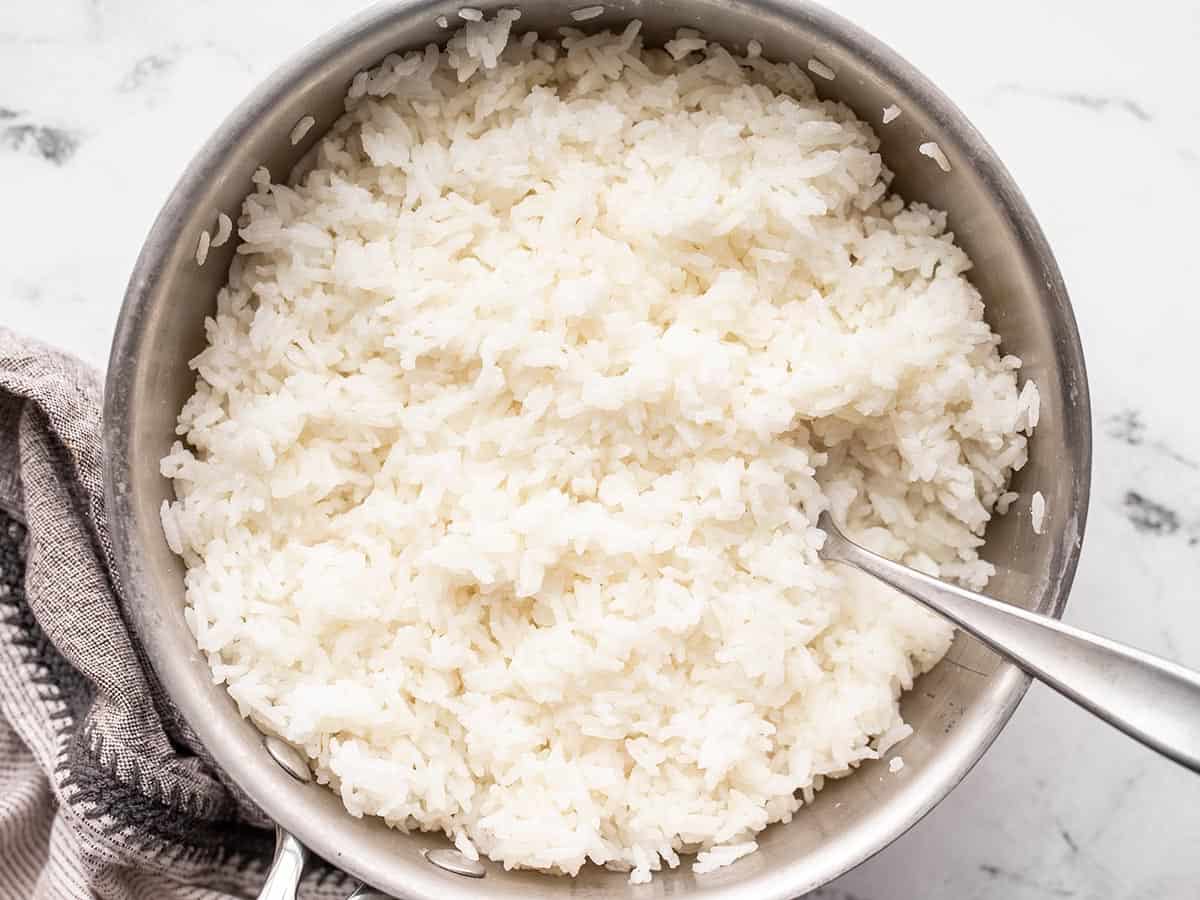
How to Cook Rice
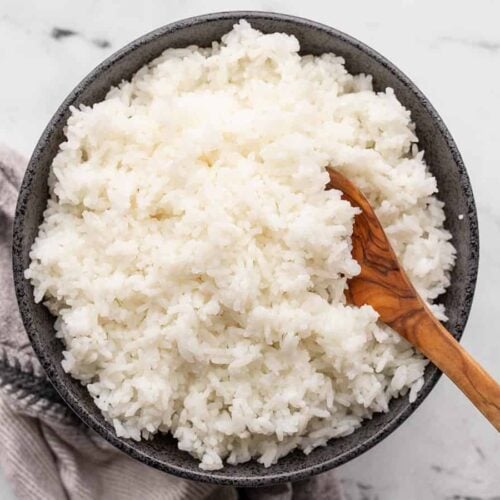
Ingredients
- 1 cup long grain white rice*
- 1.5 cups water
- 1/4 tsp salt
Instructions
- Rinse the rice using a fine wire mesh strainer.
- Add the rice, salt, and water to a saucepot.
- Place a lid on the pot, turn the heat on to high, and bring the water up to a full boil.
- Once the water reaches a full boil, turn the heat down to low and let the rice continue to simmer for 15 minutes. Do not lift the lid or stir as it simmers. Make sure it maintains a gentle simmer the entire time.
- After simmering for 15 minutes, turn off the heat and let the rice rest without lifting the lid or stirring, for an additional five minutes.
- After letting the rice rest, lift the lid and fluff with a fork. Serve hot.
See how we calculate recipe costs here.
Equipment
- Mesh Sieve
- Measuring Cups Spoons
Notes
Nutrition
How to Cook Rice – Step by Step Photos
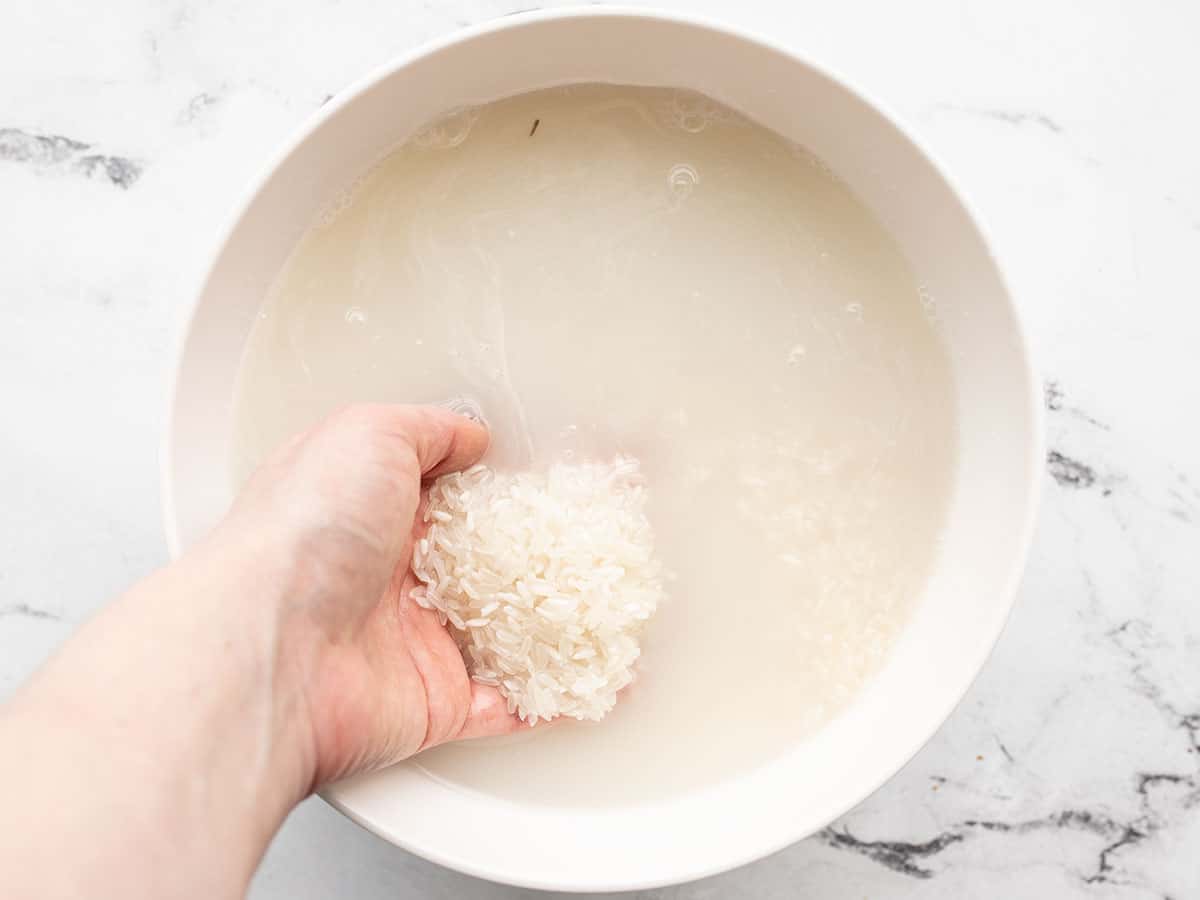
Rinse the rice first with a fine wire mesh strainer or in a bowl. If rinsing in a bowl, swish it around a few times then carefully pour off the rinse water. Repeat this 3-4 times, pouring off as much water as possible with the last rinse.
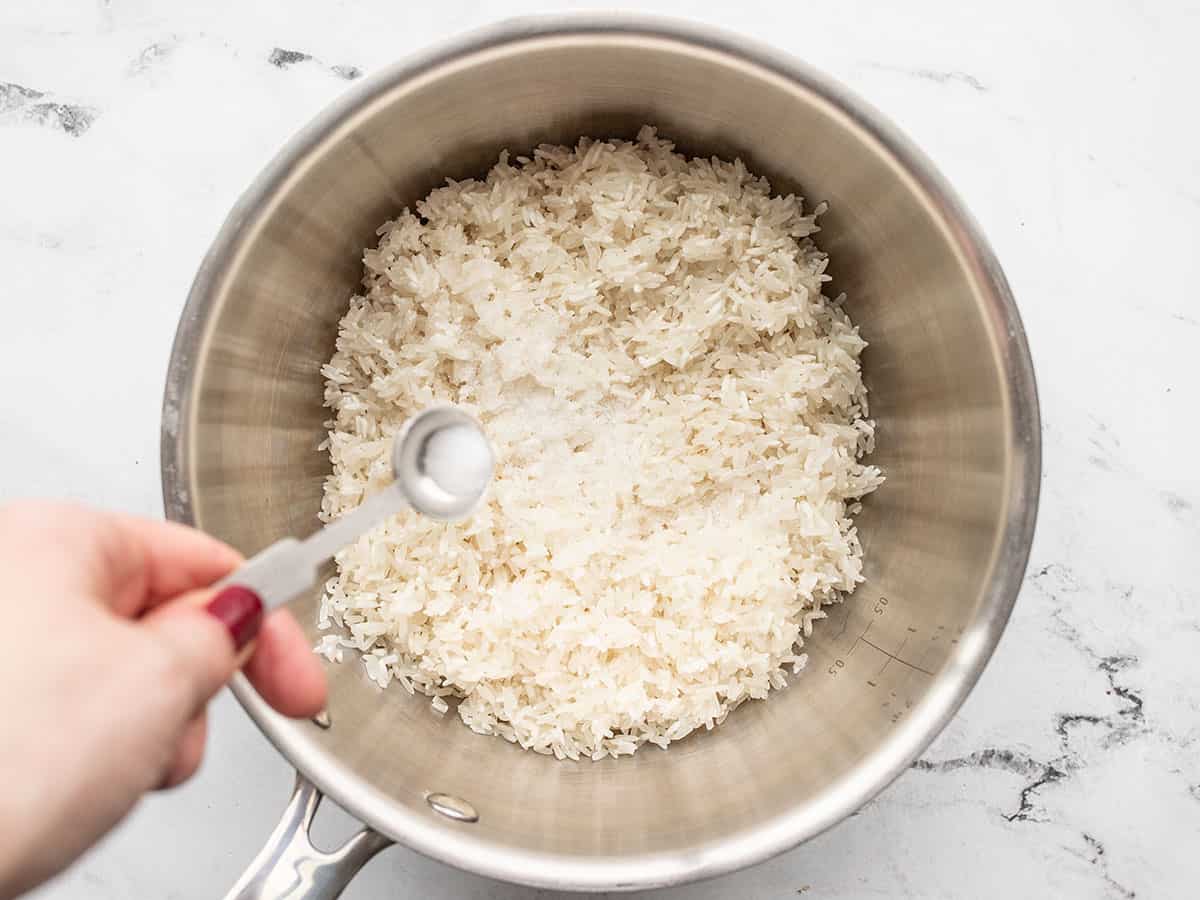
Place one cup of rice in a saucepot, then add ¼ tsp salt.
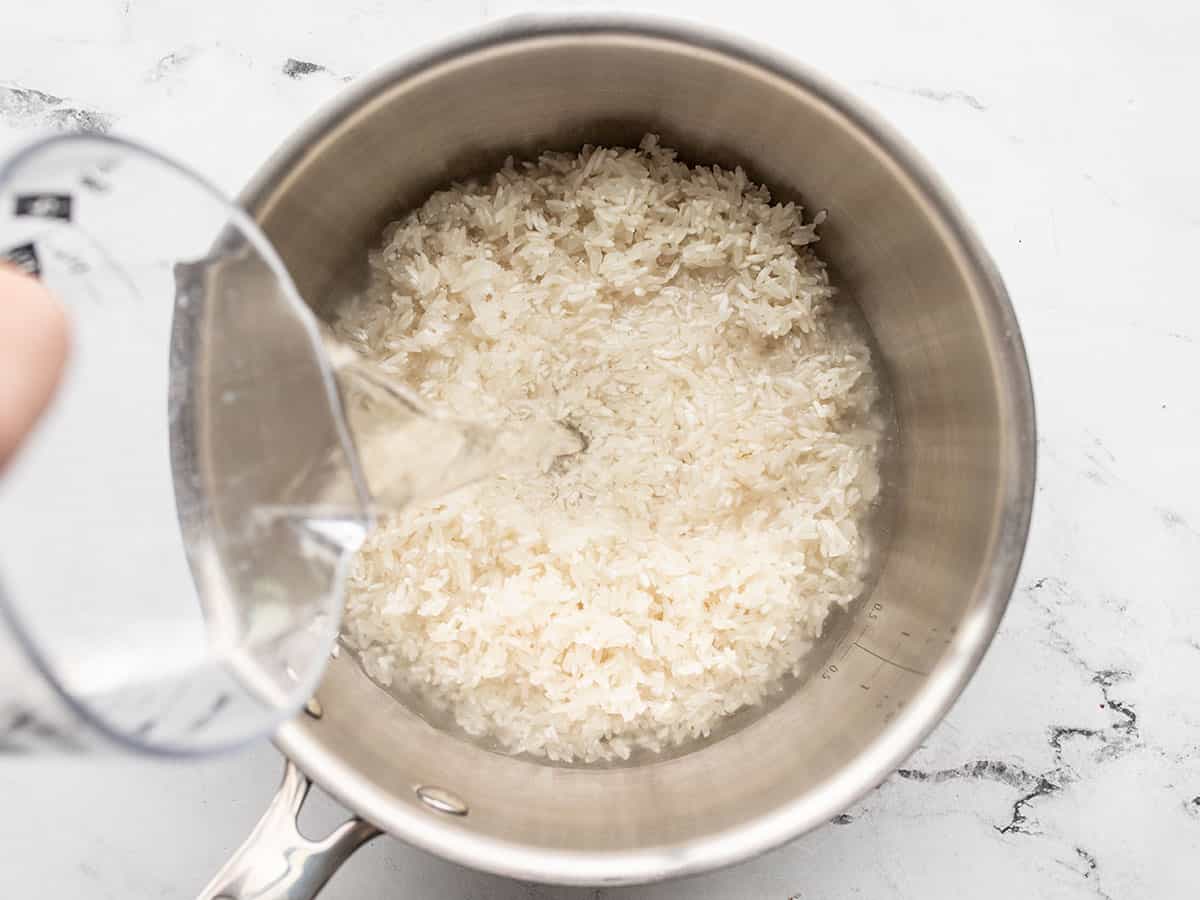
Also add 1.5 cups of water.
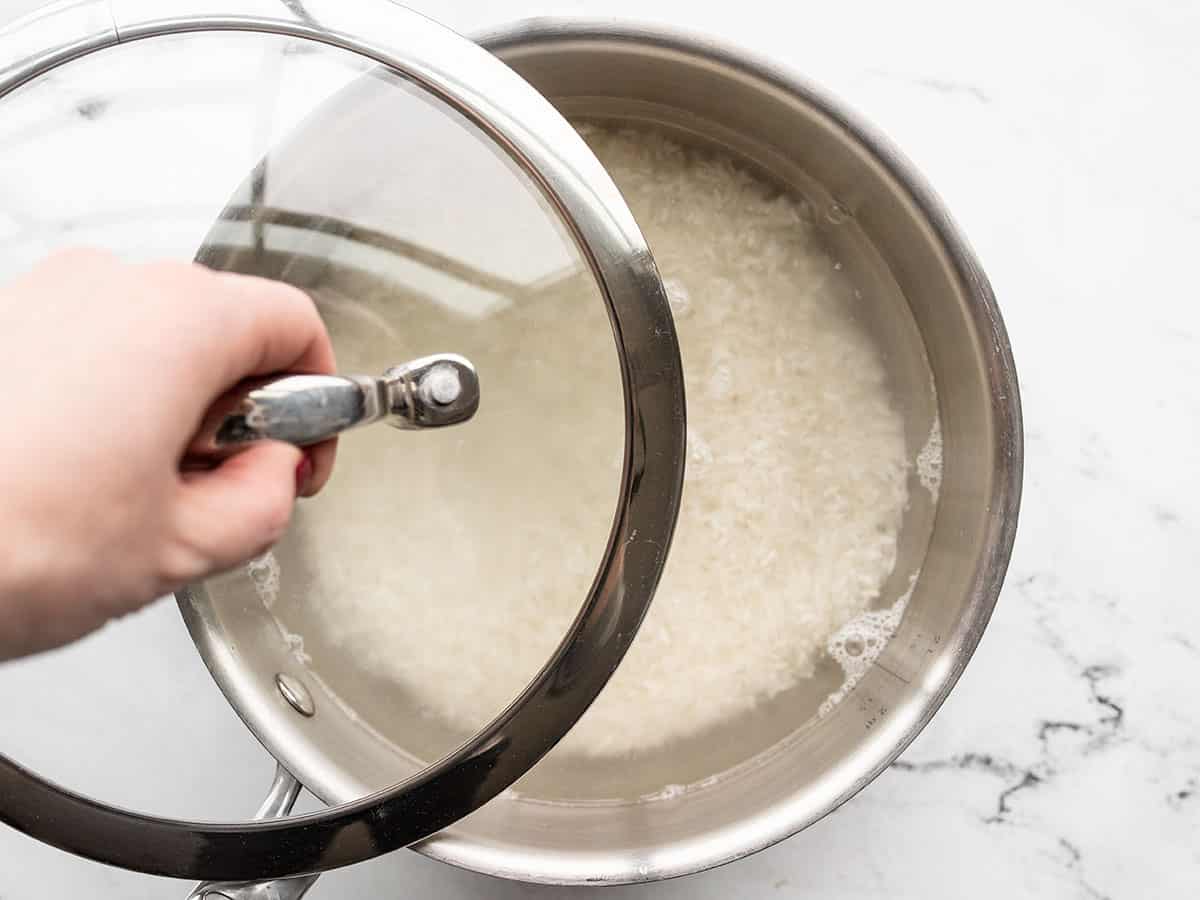
Place a lid on the pot, turn the heat on to high, and bring the water up to a full boil.
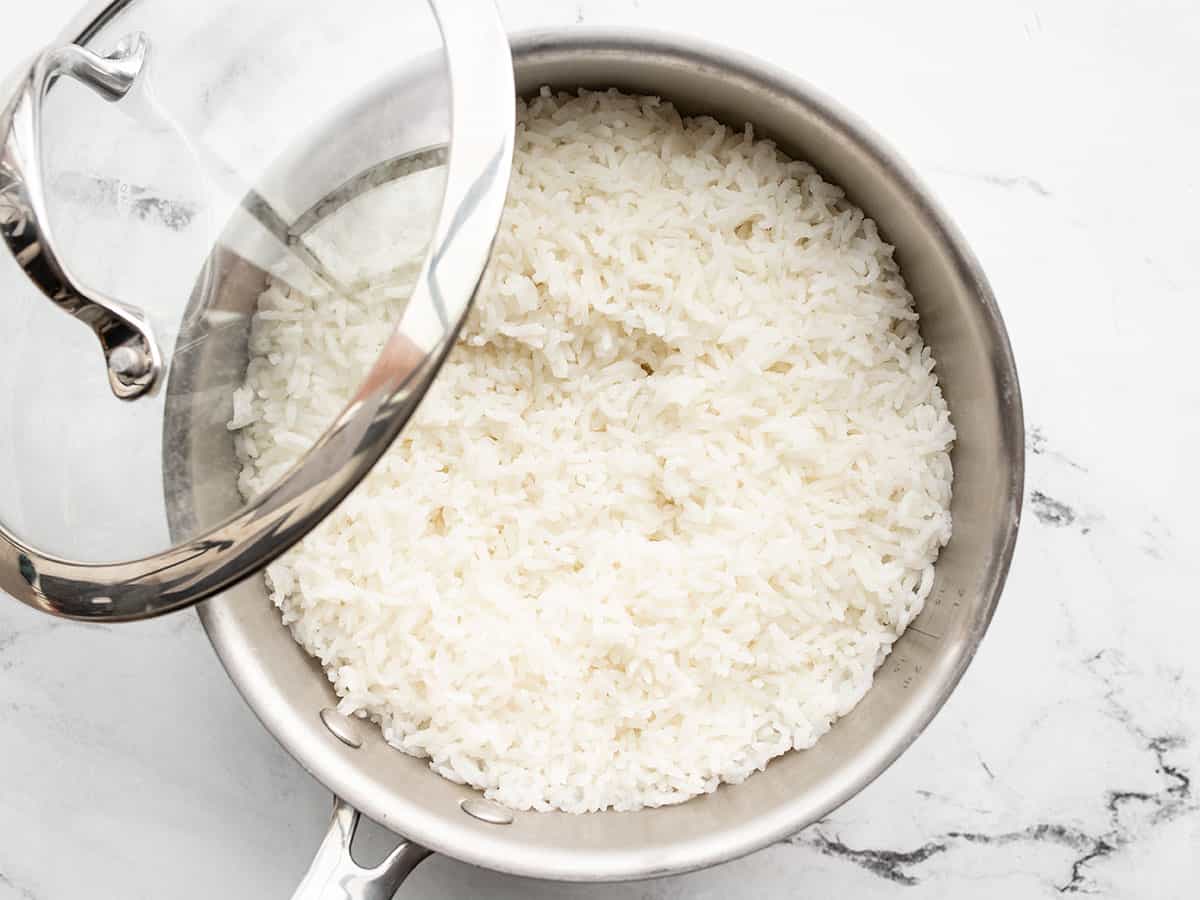
Once it reaches a full boil, turn the heat down to low and let the rice simmer for 15 minutes. Do not remove the lid or stir the rice while it simmers. After 15 minutes of simmering, turn off the heat and let the rice rest for an additional five minutes (still no lifting the lid or stirring!).
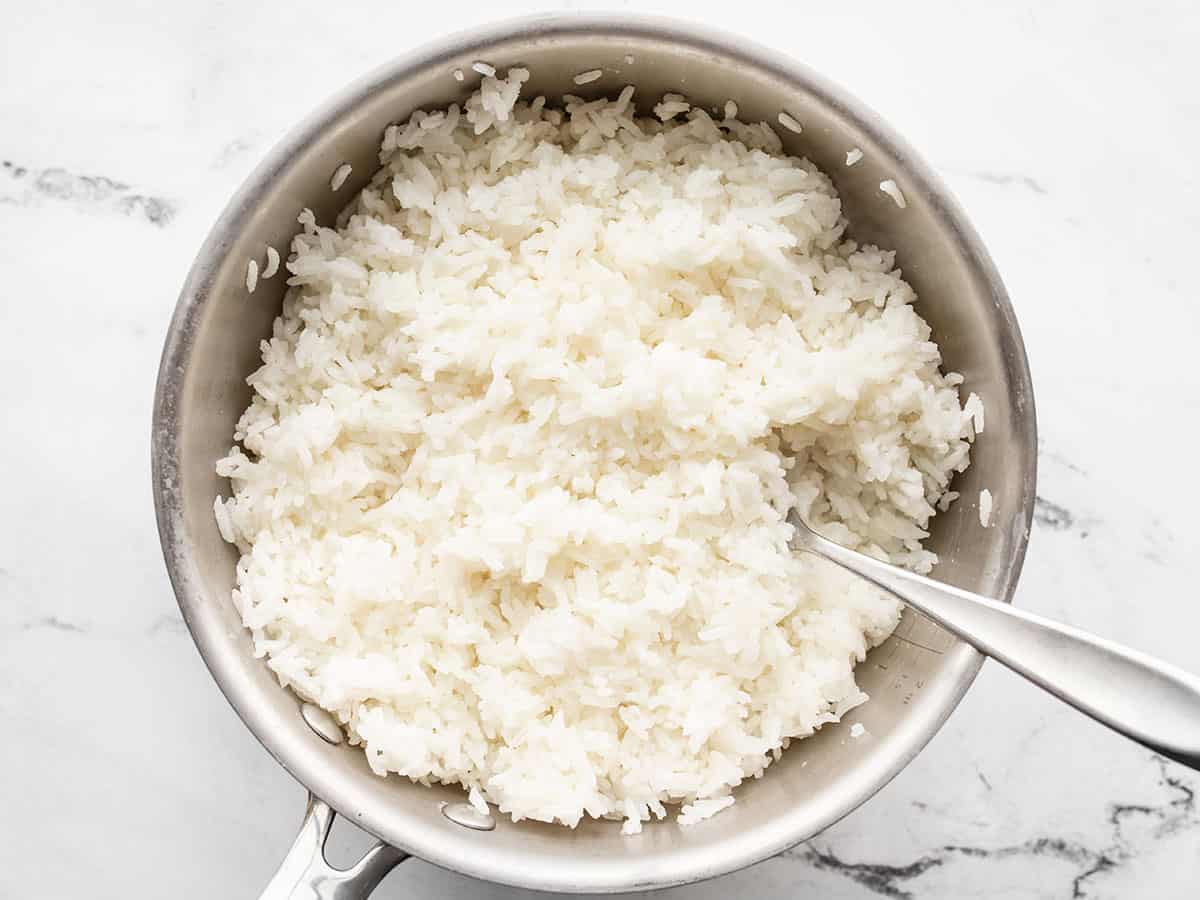
Finally, after the rice has rested, lift the lid and fluff with a fork. Serve hot with your favorite meal!
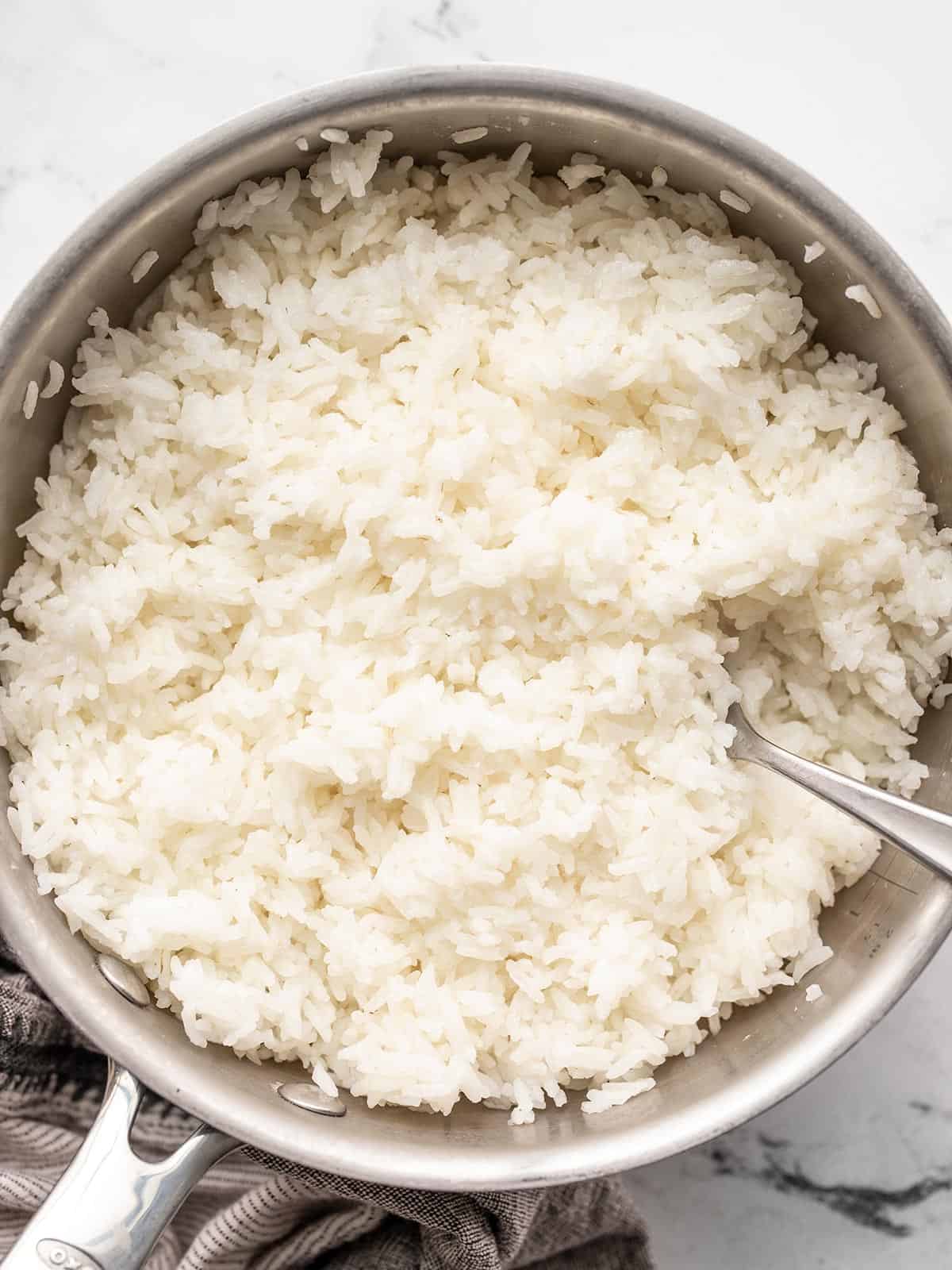
Troubleshooting
- Burned rice: heat was too high when simmering, not enough water was used or too much steam escaped while simmering (keep that lid on tight), or thin cookware caused hotspots on the bottom.
- Mushy rice: too much water was used or not enough water was drained after rinsing, rice was stirred during cooking.
- Crunchy rice: not enough water was used, too much steam escaped during simmering (do not lift the lid), uneven heating (outside edges not simmering so the rice could not absorb the water), rice not allowed to rest after simmering.
- Rice cooked unevenly: Burner was too small for the pot, thin pot that does not conduct heat evenly, rice was not allowed to rest after simmering.
When to Use a Rice Cooker
Still can’t get the hang of it? No problem. Sometimes using a rice cooker really is the best option! Rice cookers are generally inexpensive, they are quite versatile (you can cook more than just rice in them), and they leave your hands and attention free to tend to other things while preparing your meal. There’s no shame in using a rice cooker!


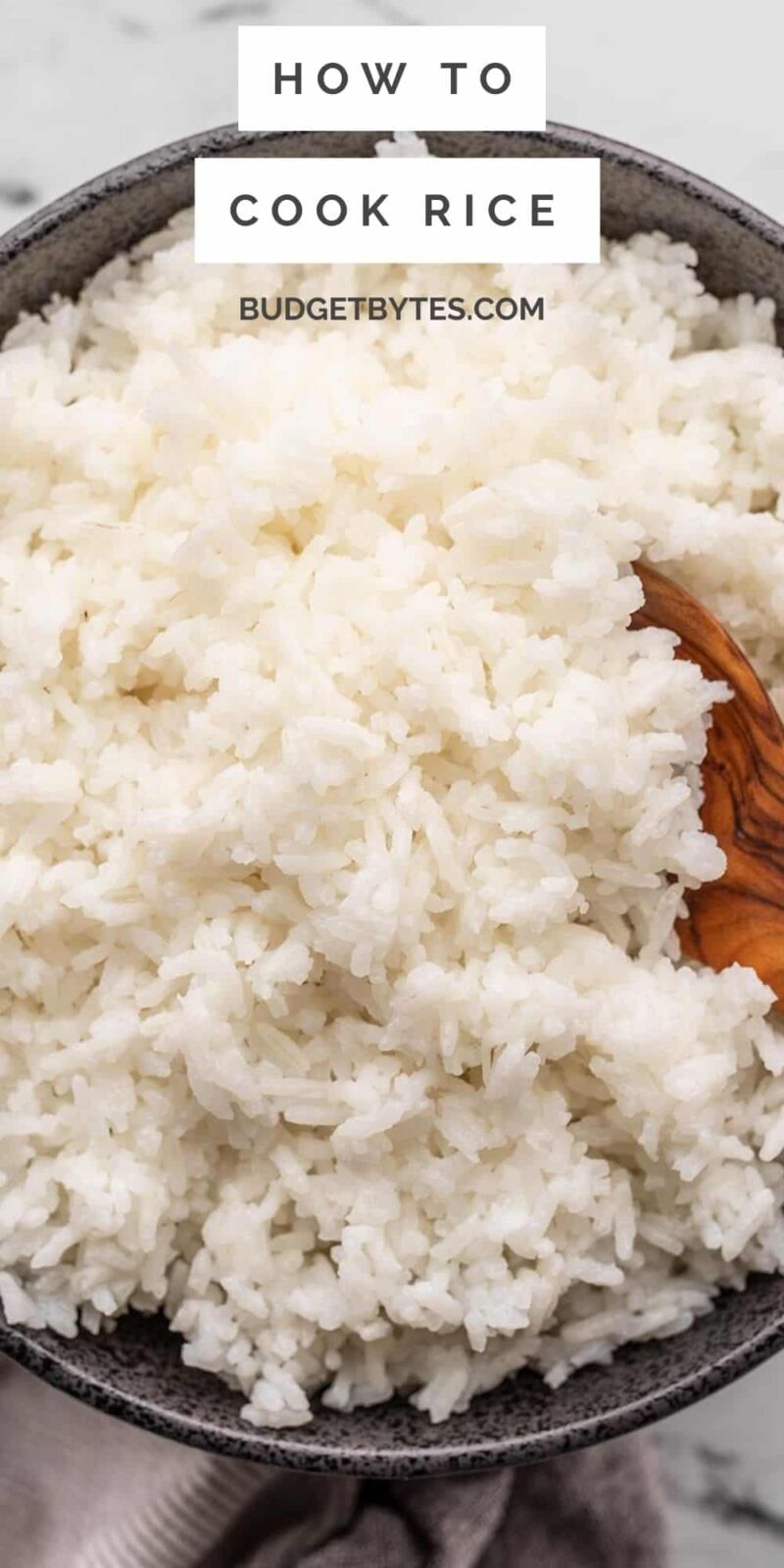
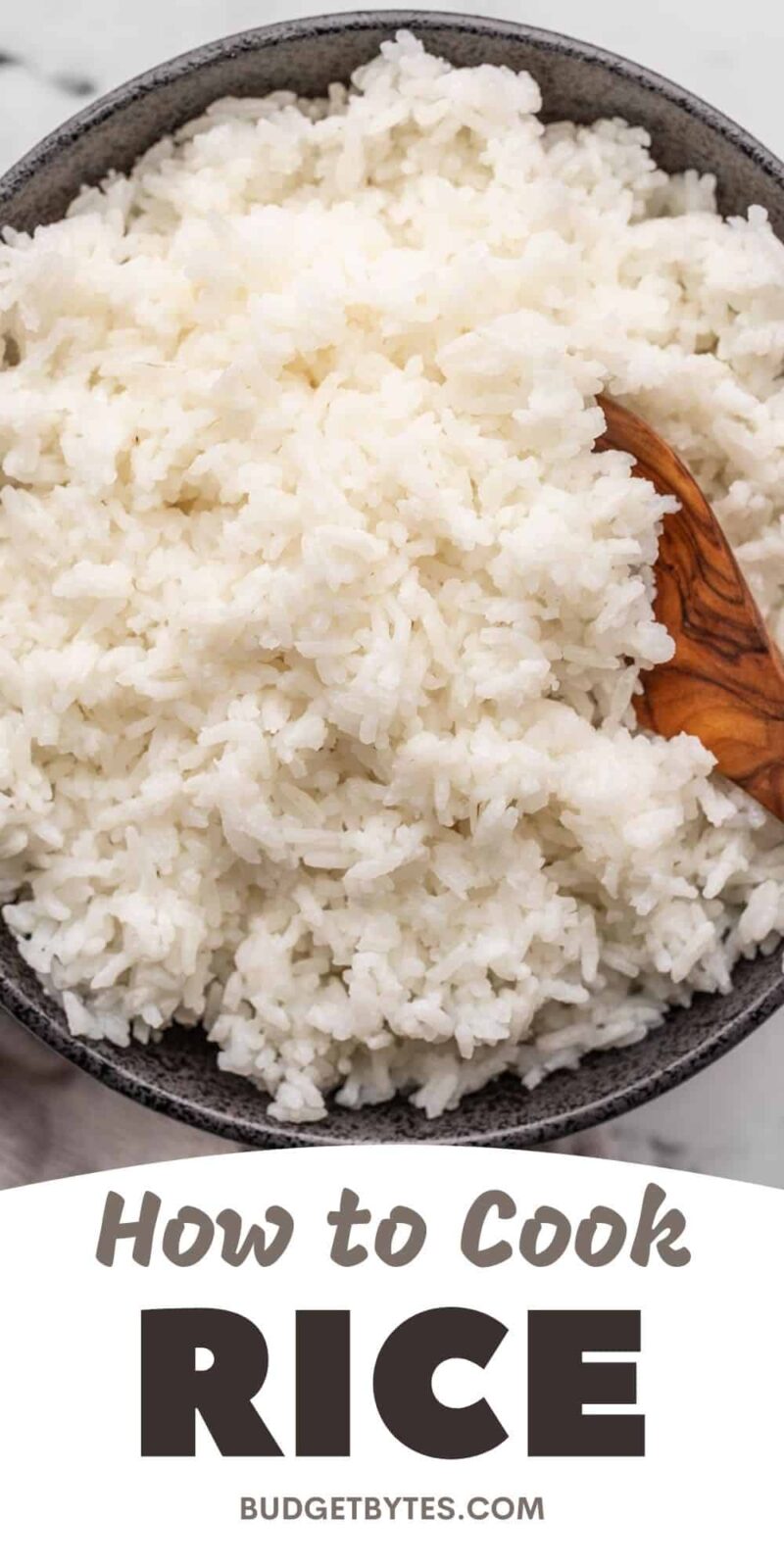
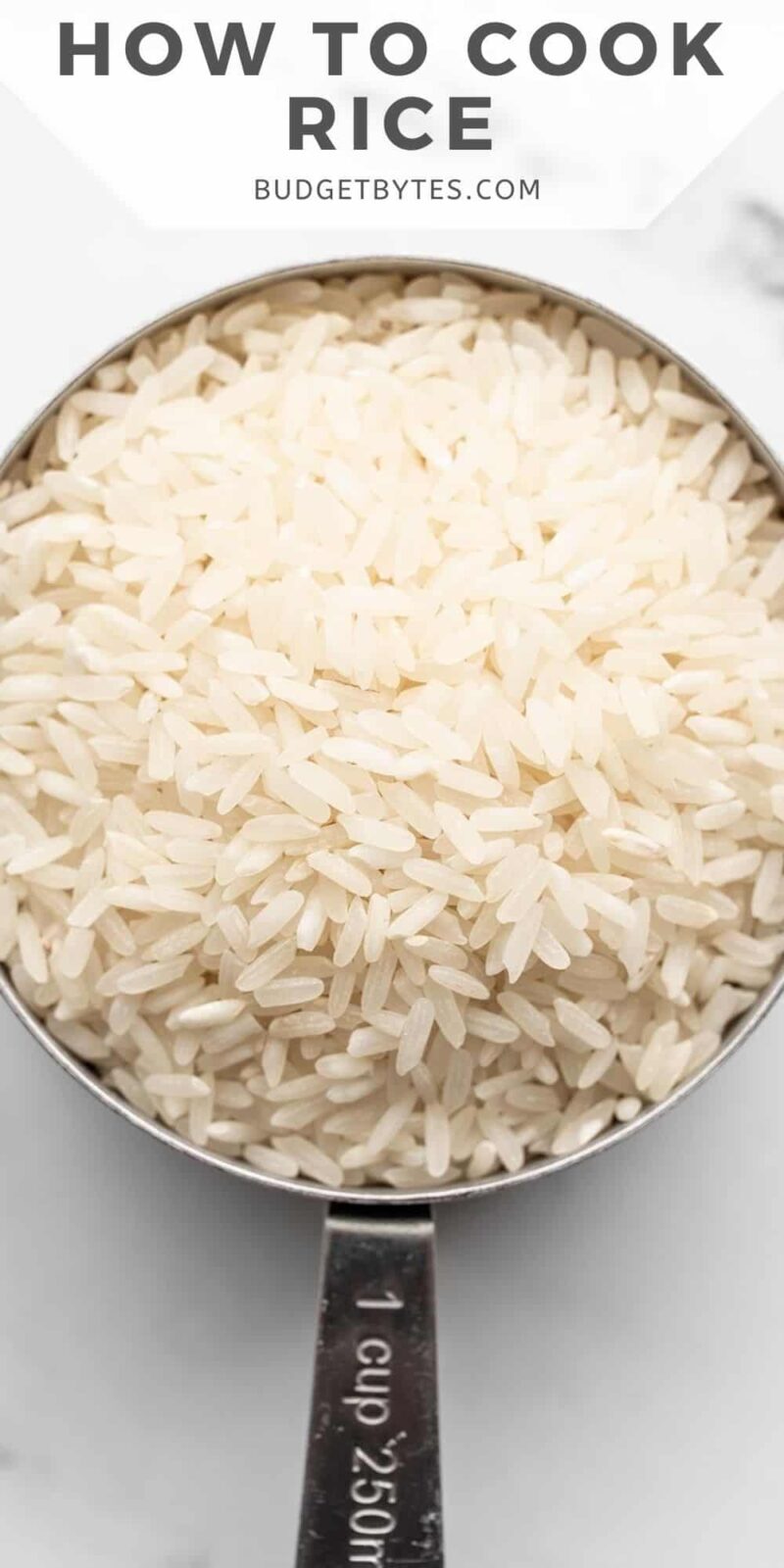
Thank you
I struggled with making rice in my instant pot for months! This is so much easier and comes out perfectly every time. Thank you!
Although it is slightly time consuming, this method cooks rice perfectly!
Simple, foolproof, perfect. Thank you!
These are definitely good guidelines but cooking rice can be even easier than this period. A rice cooker makes it almost full proof. You can’t mess it up. You don’t need to measure your rice. Just pour the amount that you like in the rice cooker container. Put some water in and swish it around. Just cut your hand on the side of the rice cooker as you pour the water out so that the rice stays in the cooker. I usually rinse 2 to 3 times until the water starts to clear up. After rinsing, just put enough water in to about a 1/2 inch above the rice and then cook. Comes out perfect every time!
I cook rice at least twice a week. Generally just bring it to the boil and simmer for 15 to 17 minutes, but I break all your rules. I stir it (only occasionally), I don’t measure the water accurately and I don’t leave the top on tight. I usually place a wooden spoon across the top of the pot, with the lid on, to let the steam escape – brown rice is pretty hard to get wrong, and its always good, nutty and cooked through, although I do taste test after 15 minutes.
I find the white rice – which I prefer not to use, is more ‘up and down’ – mixed results. Not as robust perhaps as the brown rice. I will try your method for the white rice, thanks for the insight.
What about black (aka Forbidden) rice and wild rice? What are the rice/water ratios and the times for those?
I don’t know those ratios off-hand because I rarely cook those varieties. It’s best to check the instructions on the package, or you can do a Google search.
American Filipino here! I only every make rinsed jasmine rice in the rice cooker with equal parts water and rice b/c that’s how my mom makes it. so seeing other ways to make it is nice. Thank you for sharing. :)
Question: can I cook brown rice in a rice cooker and I’m assuming I should add more water?
Yes, most rice cookers will have a special function for brown rice, since it takes longer to cook, so you’ll want to check for that. Your rice cooker may also have a specific water ratio they recommend for brown rice, so make sure to look in the manual for that as well. On the stovetop, brown rice usually takes 2-2.25 cups of water per cup of brown rice, but it can be slightly different for rice cookers.
I made it in the rice cooker and put some extra water in it and the brown rice turned out perfect!
Instant pot is my preferred method. It always comes out the same and an appliance that is already on the countertop
Hi Beth, What if you can’t serve the rice right away. Is it better to keep the lid on or off while waiting?
Thanks!
Susan
I like to keep the lid on so it doesn’t dry out and it helps it stay warm (assuming it’s just while waiting for the rest of the meal to cook). :)
Your assumption is correct! Thanks for the fast response, a great article and an amazing website
You’ve helped my cooking skills expand immensely:)